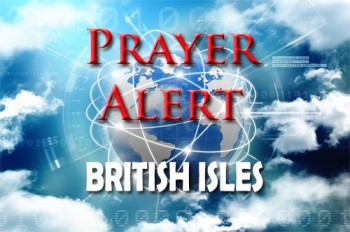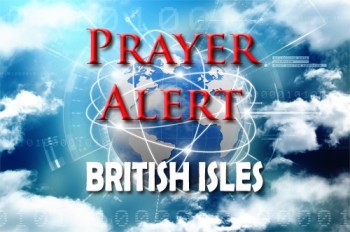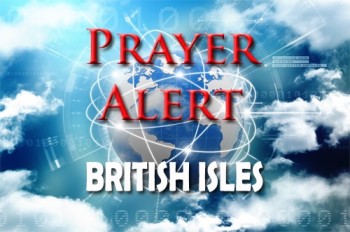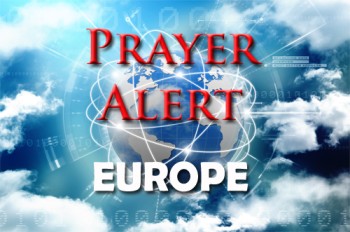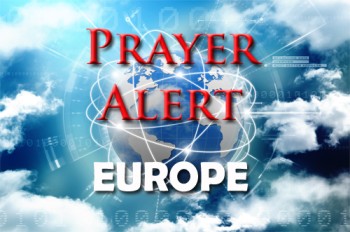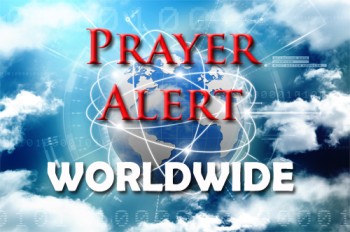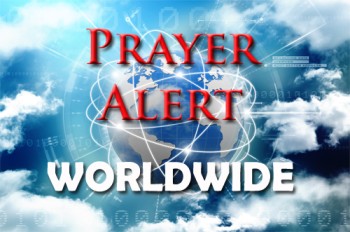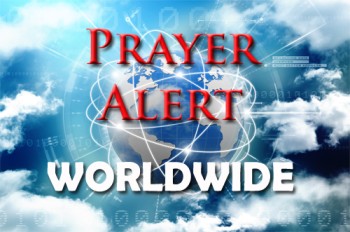
David Fletcher
David Fletcher is Prayer Alert’s Editor.
He is part of a voluntary team who research, proof-read and publish Prayer Alert each week.
If you would like to make a donation towards our running costs, please click here.
Conservative councillor Clare De Silva has expressed her sadness at fellow Christian Danny Kruger’s defection to Reform UK. Kruger, MP for East Wiltshire since 2019 and formerly shadow work and pensions minister under Kemi Badenoch, announced his move alongside Nigel Farage, who appointed him to lead a new Reform team preparing for government. Calling the decision 'very painful’, Kruger declared, 'The party is over: the flame is passing from one torch to another’, and praised Farage as 'our last hope' on the right. De Silva told Premier Christian News she was shocked and saddened, calling the departure a poignant loss. While disagreeing with his choice, she stressed the importance of Christians disagreeing well in politics: 'I know Danny is a God-fearing man and will have made this decision really carefully… we should disagree well.' The moment highlights both division and opportunity for grace among believers in public life.
Brussels has warned that no deal on easing border checks for UK food imports will be reached unless Britain agrees to expand youth mobility schemes. The proposed sanitary and phytosanitary (SPS) agreement - central to Labour’s plan to reduce food costs by 2027 - would align rules on plants, animals, and food products, cutting supermarket prices and border delays. But EU negotiators insist progress depends on allowing more young Europeans aged 18 to 30 to live and work in the UK. Cabinet office minister Nick Thomas-Symonds pressed for urgency during talks in Brussels, stressing the need for relief as food inflation has risen for five consecutive months, with key staples up 5.1% annually. European diplomats, however, argue the SPS deal is more important for Britain than the EU. Meanwhile, UK firms face possible exclusion from bidding on EU defence projects worth €150 billion unless terms are finalised soon, with France resisting UK involvement. The Government faces mounting pressure as household food costs continue to climb.
MPs have warned against scrapping education, health and care plans (EHCPs) for children with special educational needs and disabilities. In a new report, the education select committee calls for EHCPs to remain as a vital 'backstop of accountability' for families, alongside statutory minimum standards for SEND provision in all schools. The eight-month inquiry highlights the unsustainable strain on the system, with 638,745 children now holding EHCPs - the highest since their introduction. Despite a decade of rising funding, outcomes for many pupils remain poor, and parents often face exhausting battles to secure support. The committee recommends more training for teachers, greater specialist provision, and funding increases in line with inflation. Campaigners stress that EHCPs give children enforceable rights, while the Government insists reforms will strengthen provision and reduce the need for conflict. MPs argue that long-term sustainability requires an inclusive, well-resourced education system backed by cross-agency cooperation.
Watched by US military officers and delegates from Turkey and Hungary, Russia and Belarus have launched large-scale military exercises across their territories and nearby seas, showcasing advanced weaponry and tactical nuclear capabilities near NATO’s eastern flank. The drills, involving roughly 6,800 troops as well as fighter jets and missiles, practised modern combat tactics like drone-assisted infantry assaults. Relations between Washington and Minsk seem to be improving; Belarus has recently released 52 political prisoners, prompting the Trump administration to ease some sanctions. Meanwhile, NATO allies remain uneasy after Russian drones repeatedly violated Polish and Romanian airspace. European leaders worry the exercises highlight Russia’s growing nuclear reach and evolving battlefield strategies, while Moscow insists it is open to dialogue but blames Western nations for obstructing progress toward resolving regional tensions.
Ten years after Angela Merkel opened Germany’s borders to migrants with her famous ‘We can do this’ pledge, the nation continues to grapple with the political and social repercussions. Syrian refugee Anas Modamani, who arrived alone at 17 after a perilous journey and became briefly famous for a viral selfie with Merkel, now lives in Berlin with German citizenship and an IT career. Between 2015 and 2024 Germany registered 2.6 million first-time asylum requests - over a third of the EU total - primarily from Syria, Afghanistan, and Iraq. While many Germans initially embraced ‘Willkommenskultur’, the mood has now changed significantly, evidenced in the rise of the far-right AfD. Current chancellor Friedrich Merz has tightened border controls, though courts have blocked some measures. As public opinion hardens - 68 percent now favour fewer refugees - applications from Syrians and Afghans have fallen. Modamani senses a colder atmosphere and says he might leave if hostility grows.
A UN commission of inquiry has concluded there are reasonable grounds to believe Israel has committed genocide against Palestinians in Gaza since the 2023 war with Hamas began. The 72-page report cites four of the five acts defined under the 1948 Genocide Convention - killing, causing serious harm, deliberately inflicting life-destroying conditions, and preventing births - along with statements by Israeli leaders, as evidence of genocidal intent. It highlights widespread civilian deaths, collapsed infrastructure, repeated displacement, and a UN-declared famine. Commission chair Navi Pillay said speeches by Benjamin Netanyahu and other officials, combined with Israel’s military conduct, support the inference of intent to destroy those living in Gaza in whole or part. The commission also warned other nations of their legal duty to prevent and punish genocide, noting potential complicity if they fail to act. Israel’s government rejected the findings as false and biased, arguing that its operations are targeting Hamas in self-defence and comply with international law. Meanwhile, the long-awaited offensive by the Israeli military against Gaza City has begun: see
The massive 650,000-barrel-per-day Dangote refinery has delivered its first US gasoline export, signalling a new chapter in global fuel trade. The tanker Gemini Pearl discharged about 320,000 barrels of gasoline at Sunoco’s Linden facility in New York harbour, with Vitol purchasing the cargo from Switzerland-based Mocoh Oil and selling most of it to Sunoco. The shipment meets stringent US motor fuel standards, a key milestone for the refinery after many startup delays. Two more USA-bound cargoes are en route. While these exports demonstrate Dangote’s potential to reshape energy flows and reduce Nigeria’s reliance on fuel imports, further US deliveries may pause soon because the refinery’s gasoline unit is expected to undergo two to three months of repairs, according to an industry monitor. Meanwhile, the refinery has also begun direct fuel supplies to marketers in Nigeria, which potentially could put an end to the country's shortages. See
Syria is facing its worst drought in 36 years, devastating wheat production and deepening a nationwide hunger crisis. Farmer Maher Haddad has harvested barely a third of his normal yield, reflecting a 40% drop in wheat output across the country. The FAO estimates a shortfall of 2.73 million tonnes this year - enough to feed 16 million people - while rainfall has plunged 70%, crippling three-quarters of rain-fed farmland. Nearly 90% of Syrians already live in poverty; over 14 million are food insecure, and 9.1 million suffer acute hunger. Bread prices have skyrocketed, forcing families to borrow for daily food. Aid groups like the World Food Programme are providing emergency subsidies and direct payments to farmers, but long-term solutions such as new irrigation systems are hampered by years of war, soaring fuel costs, and economic collapse. Without sustained international support and adequate rainfall, Syria’s food crisis could escalate dramatically into 2026, threatening rural livelihoods and driving further displacement.
In July, protests over fuel price hikes erupted across Angola, paralysing parts of the capital Luanda and spreading to other provinces. Sparked by a taxi drivers’ strike, these demonstrations quickly turned violent, leaving at least thirty dead and thousands arrested. Many residents now fear speaking openly, wary of reprisals. The unrest exposed deep social and economic inequalities in the oil-rich nation, where youth unemployment stands at 54% and over a third of the population survives on less than £1.50 a day. Young people, frustrated by poverty, corruption, and lack of opportunity, led the protests, which sociologists describe as a response to decades of misgovernance since the civil war ended in 2002. President João Lourenço condemned the violence as foreign manipulation but faces criticism for failing to diversify the economy or curb high inflation. As Angola prepares to celebrate fifty years of independence, many fear further unrest before the 2027 elections if systemic issues remain unaddressed.
Seoul’s household landscape is shifting as single-person homes become the city’s most common household type, according to a 2024 report. Nearly 1.66 million residents now live alone - about 40% of all households - while two-person households make up 26.2% and four-person homes 12.3%. An aging population underscores the trend: people 60 and older represent 20.2% of residents, and more than 30% of households include someone 65 or older. Marriages, which plunged during the pandemic, rebounded to 42,471 in 2024, with an average first-marriage age of 34.3 for men and 32.4 for women; international marriages comprise roughly 10%. Divorces declined overall, but the average age at divorce has risen, with one-quarter now among those 60 and older. Meanwhile, households with young children have fallen over 40% since 2016, reflecting persistently low birth rates. City officials plan inclusive policies to counter social isolation, support young adults’ housing needs, and foster a more child-friendly environment.

